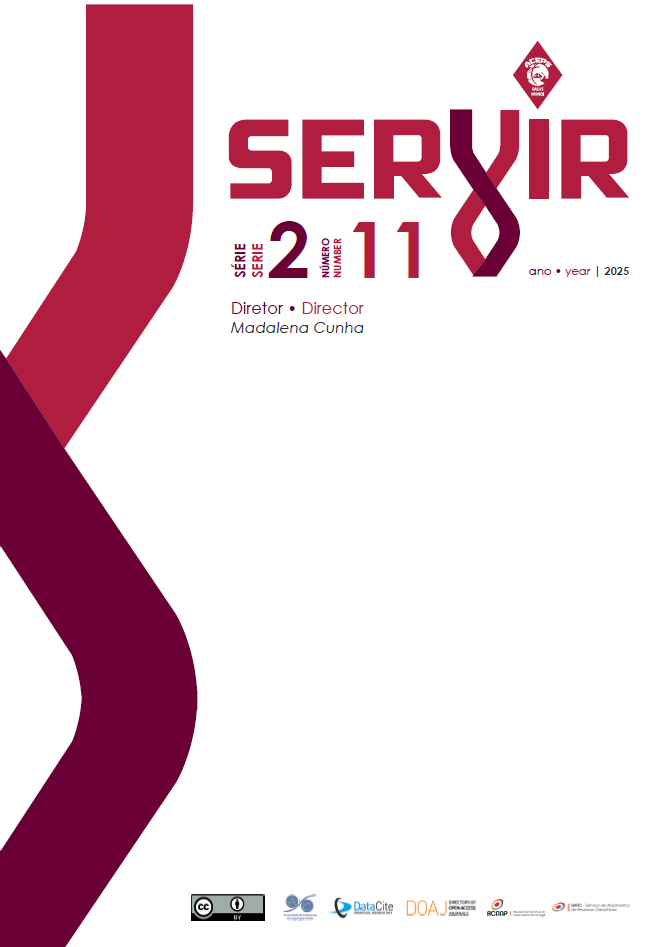Nurses' Role in Medication Reconciliation in Chronically Ill Patients in Ambulatory Care
A Scoping Review Protocol
DOI:
https://doi.org/10.48492/servir0211.36274Keywords:
Medication Reconciliation, Chronic Disease, Ambulatory CareAbstract
Introduction: Medication reconciliation being a process that reduces the risk of medication discrepancies, will enable better management of the chronic condition to improve the patient's quality of life and prevent complications.
Objective: To map the existing scientific evidence on the role of nurses in medication reconciliation for chronically ill patients in ambulatory care. This knowledge is essential for a more effective and adequate understanding of this phenomenon and to increase the safety and quality of care provided by nurses using evidence-based practice as a reference.
Methods: The methodology chosen was a scoping review as proposed by the Joanna Briggs Institute (JBI) and considering the Preferred Reporting Items for Systematic Reviews and Meta-Analysis Protocols (PRISMA-P). To define the eligibility criteria, it was followed the Population, Concept and Context (PCC) reference framework. Based on that, this review will consider studies that address the role of the nurse in medication reconciliation in the chronically ill in ambulatory care. Study selection, data extraction and synthesis will be carried out by two independent reviewers. The review will consider all studies, published and gray literature, without temporal limitations, in any language.
Results: The results will be presented in a descriptive way, using tables, considering the objective and focus of the scoping review.
Conclusion: It is expected that the results obtained will provide an overview of the importance of the nurse's role in medication reconciliation in chronically ill patients in ambulatory care.
Downloads
References
Al-Hashar, A., Al-Zakwani, I., Eriksson, T., & Al Za'abi, M. (2017). Whose responsibility is medication reconciliation: Physicians, pharmacists or nurses? A survey in an academic tertiary care hospital. Saudi pharmaceutical journal, 25(1), 52–58. https://doi.org/10.1016/j.jsps.2015.06.012
BIREME / OPAS / OMS. (2023). Descritores em Ciências da Saúde: DeCS. Disponível em: http://decs.bvsalud.org
Ordem dos Enfermeiros. (2018). “Regulamento no. 429/2018 da Ordem dos Enfermeiros”. Diário da República: II Série, 135. Disponível em: https://diariodarepublica.pt/dr/detalhe/regulamento/429-2018-115698617
Direcção-Geral da Saúde. (2016). Norma 018/2016: Reconciliação da Medicação Disponível em: https://normas.dgs.min-saude.pt/2016/12/30/reconciliacao-da-medicacao/
George, F; Gomes, S. (2014). Cuidados de Proximidade em Doenças Crónicas. Disponível em: https://www.dgs.pt/ficheiros-de-upload-2013/publicacoes-de-francisco-george-cuidados-de-proximidade-em-doencas-cronicas-pdf.aspx
Keogh, C; Kachalia, A; Fiumara, K; Goulart, D; Coblyn, J; Desai, SP. (2016). Ambulatory Medication Reconciliation: Using a Collaborative Approach to Process Improvement at an Academic Medical Center. Jt Comm J Qual Patient Saf. 42(4):186-194. doi:10.1016/s1553-7250(16)42023-4
Marshall SE. (2023). Practice review: Medication reconciliation in the ambulatory setting. Nursing management, 54(11), 30–35. https://doi.org/10.1097/nmg.0000000000000070
Munn, Z., Peters, M. D. J., Stern, C., Tufanaru, C., McArthur, A., & Aromataris, E. (2018). Systematic review or scoping review? Guidance for authors when choosing between a systematic or scoping review approach. BMC medical research methodology, 18(1), 143. https://doi.org/10.1186/s12874-018-0611-x
Ordem dos Enfermeiros. (2023). Apreciação pública da Ordem dos Enfermeiros sobre a proposta de lei que altera os estatutos de Associações Públicas Profissionais. Disponível em: https://www.ordemenfermeiros.pt/media/30148/sai-oe_2023_8004.pdf
Peters, M. D. J., Marnie, C., Tricco, A. C., Pollock, D., Munn, Z., Alexander, L., McInerney, P., Godfrey, C. M., & Khalil, H. (2020). Updated methodological guidance for the conduct of scoping reviews. JBI evidence synthesis, 18(10), 2119–2126. https://doi.org/10.11124/JBIES-20-00167
Pinto A, Mota L. (2023). Evidence-based practice instruments for nurses validated for Portugal: scoping review protocol. RevSALUS, 5(1). https://doi.org/10.51126/revsalus.v5i1.487
Tricco AC, Lillie E, Zarin W, O’Brien KK, Colquhoun H, Levac D, et al. (2018). PRISMA Extension for Scoping Reviews (PRISMA-ScR): Checklist and Explanation. Annals of internal medicine, 169(7), 467–473. https://doi.org/10.7326/M18-0850
Unni E. (2023). Medicine Use in Chronic Diseases. Pharmacy (Basel, Switzerland), 11(3), 100. https://doi.org/10.3390/pharmacy11030100
Wilson, M. L., Murphy, L. S., & Newhouse, R. P. (2013). Medication reconciliation across the continuum of care: a meaningful use mandate. The Journal of nursing administration, 43(6), 311–314. https://doi.org/10.1097/NNA.0b013e3182942b33
World Health Organization. (2013). 10 facts on Noncommunicable Diseases. Disponível em: https://www.who.int/news-room/fact-sheets/detail/noncommunicable-diseases.
World Health Organization. (2014). The High 5s Project-Standard Operating Protocol - assuring medication accuracy at transitions in care. Disponível em: https://www.who.int/initiatives/high-5s-standard-operating-procedures.
Published
How to Cite
Issue
Section
License
Copyright (c) 2025 Cláudia Moreira Silva, Soraia Pereira

This work is licensed under a Creative Commons Attribution 4.0 International License.
In order to promote the free circulation of knowledge, Servir is open access journal. All its content is available and protected under the Creative Commons license (CC BY 4.0).
The journal allows self-archiving in institutional repositories of all versions, which may become immediately available


